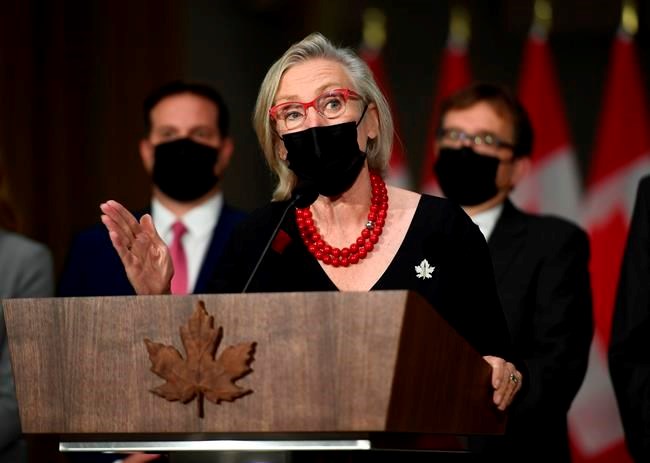OTTAWA — Though provincial governments are clamouring for more funds to bolster their health systems in the wake of COVID-19, some are pushing back against a Liberal election promise to offer dedicated funding for mental health.
Federal contributions to provincial health systems, including mental health services, are funded by the Canada Health Transfer.
In the federal election campaign, the Liberals pitched a transfer specifically targeted at mental health care, starting with $4.5 billion over five years.
The transfer would be hitched to national standards to ensure a certain level of accessible care across the country.
Two provinces on opposite ends of the political spectrum agree a dedicated transfer is the wrong approach.
"What they're proposing is both inefficient and … an undermining of the fundamentals while having a debate about, in some respects, credit. I don't think that's what we need," said British Columbia Health Minister Adrian Dix in an interview with The Canadian Press.
B.C. currently funds its mental health services using the Canada Health Transfer, and Dix said the province will need to continue to do that even if a separate transfer is established.
That's because it's impossible to parse mental health funding from the rest of the health system, he says.
"Mental health is linked to physical health, and the way to address those best is to address the Canada Health Transfer," he said.
All province and territories have come together to demand the federal government to immediately grow its share of overall health-care costs from 22 to 35 per cent — an increase of about $28 billion more this year.
They've also asked for minimum funding increases of five per cent annually, arguing the current plan of three per cent jumps in spending means transfers don't keep pace with yearly cost increases.
All provinces agree the increased funding should come without conditions set by the federal government, so that each jurisdiction can target their own unique needs.
"We have distinct challenges and solutions, and we believe the Government of Canada will be most effective if it focuses on being a funding partner and promoting shared goals, rather than prescribing priorities or specific solutions with conditional funding or earmarked transfers," said Alberta Health Minster Jason Copping's spokesperson Steve Buick.
While both Alberta and B.C. have appointed ministerial positions to signal their focus on mental health, the provinces take very different approaches to address it, for example.
The new transfer isn't about taking credit for mental health services, federal Mental Health Minister Carolyn Bennett said in an interview. Rather, she said it is about developing a national strategy for mental health and introducing the funds to accomplish it.
"This is about no longer just hospitals and doctors, but knowing that we have to build the mental health human resources, we have to build the digital strategy we need to increase mental health literacy," Bennett said.
One benefit of the dedicated transfer will be that the federal government will be able to evaluate whether the funds yield results, she said.
The idea already has the support of the NDP, as long as there are good standards to accompany the funds.
"I think that having money transferred for mental health care, to be spent on mental health care, is really important and ensuring there's accountability on where that money is spent," said NDP mental health critic Gord Johns.
"We're going to be pressing the government to fund that transfer to the provinces that's directed at mental health, and ensure that there are set standards under the Canada Health Act and there's a greater accountability to ensure that money is being spent on mental health."
With all the stress health systems have endured under the pandemic, such as surgical backlogs, personnel shortages and acute care capacity, mental health could fall down the priority list without dedicated federal funding, said Michel Rodrigue, president of the Mental Health Commission of Canada.
Canada already spends less on mental health as a proportion of total health spending compared to some other OECD countries, Rodrigue said.
Where England spends 12 per cent of its health budget on mental health, Canada spends only seven per cent, he said.
"We see the transfers as a powerful tool to fill that long-standing gap in our country's patchwork of mental health services," he said.
Federal and provincial governments have not begun negotiations on the mental health-care transfer, but premiers have demanded a first ministers meeting with Prime Minister Justin Trudeau dedicated to health-care funding.
This report by The Canadian Press was first published Nov. 25, 2021.
Laura Osman, The Canadian Press
Note to readers: This is a corrected story. A previous version stated that the Liberals had pitched a mental health transfer worth $4.5 million over five years. In fact, the proposal was for $4.5 billion over five years.



